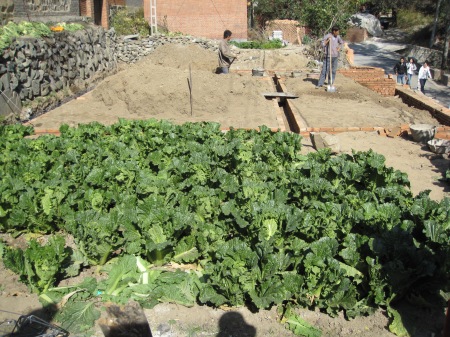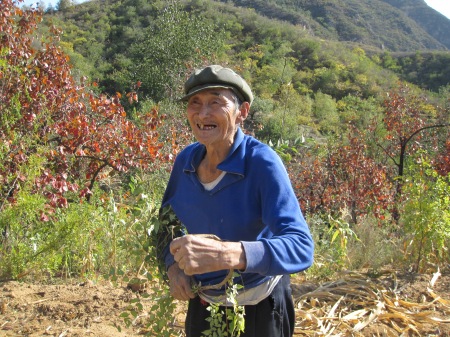Economic Trip to a Rural Village
As part of my Rural Economics class, we took a field trip to a rural village just a few hours outside Beijing in order to observe first hand, the effect (or lack thereof) urbanization and modernization has had on rural economics and rural life in China. Needless to say, the villagers were not accustomed to seeing tourists, and the only people in town were those who lived and worked there. We first went to a small cluster of new buildings which houses the towns administrative offices and documents and we met with one of the local town leaders. She described the town’s demographics and the three sources of rural income: crops, non-farm jobs, and transfer payments.
The government is almost exclusively responsible for livelihood of this rural town, like many others. Many of the residents farm the land on a lease system—a family leasing the land from the government for 20, 50, and 100 years at a time. Outside agriculture production, there is virtually no job opportunities here; the government therefore provides jobs and stable salaries for many of those who live here under a variety of government programs whether it be a wilderness fireman, a fire watcher, public security, street cleaner, or water supply manager. Jobs such as the fire watcher are available to the elderly who would otherwise not have a salary and are often not capable of participating in labor intensive vocations such as farming. These jobs are primarily created so that these residents can stay in these villages and make enough money to eat and support themselves. They are, in essence, a form of a transfer payment (almost like welfare) although they provide a service (fire control/prevention) for their town and the surrounding environment. These payments and their job creation are part of a government initiative that is attempting to keep rural life (the population and economic stability) intact in spite of the overwhelming pull of urbanization which would otherwise leave many of these townships virtually deserted and economically unviable for those who would stay.
Our economics teacher explained that the paved road on which we rode in on is also a recent addition in the last few years. It was built as “a gift” to the local government by a nearby stationed regiment of the PLA (People’s Liberation Army). Interestingly enough, it is not uncommon for this to happen that various entities (government or otherwise) make contributions or gifts to local governments to be in their favor and at the same time augmenting the infrastructure of the developing country. While the country is united under the Communist Party and aligned nationally, the operations and affairs of the various regions are very much managed on a local scale, each area having a local government with their own developmental aspirations. In some rural provinces with millions of people and thousands of townships, each town serves a month or so in a large project—i.e. a dam, irrigation system, a bridge—and afterwards are exempt forever from having to serve. In this way, huge infrastructure developments are completed and/or maintained extremely cheaply by leveraging the extensive population and therefore providing services for life for all the people in the area with only minimal required work (from an individual town’s perspective).
One aspect of rural life that was imminently obvious in the town we visited is the lack of youth. Virtually all the younger kids, once they graduate from middle school, follow the trend of urbanization and move to the city to take advantage of the budding opportunity—something that cannot be found in a small farming town such as this. Therefore, almost all of the people we encountered were in their 50’s or older and either working in a government supported non-farm job, or working on the land growing crops of some kind.
This man, pictured in his home, warmly invited us in; he had a career in the city working for the government for thirty years—finding and documenting old wells all over Beijing. He has since moved back and retired and now lives with his wife and his father, and his mother, all of whom sleep in this room on a long box which runs the length of the room and serves as a large bed. Here, with pictures of their ancestors lining the walls, they keep warm with a special coal pit which burns slowly underneath their beds.
The house is modest by all means, but much is part of a much more formidable (and cost-effective) era of farm houses which the government helps to build and is made principally from concrete with two large, bare rooms, and a small washroom (kitchen with a sink).
Above, the man is showing us a solar water heater he had constructed which is the only source of warm water for the household. In the small courtyard outside his home, he describes the various crops he cultivates with a big smile on his face. He says that although he does not need to farm for a living, he produces a modest harvest primarily for personal consumption but mostly because he loves it…telling us, “the land is part of my life” and it gives something for him and his family to tend to.
We then walking up into the neighboring mountain to find another farmer, one who had never had a career other than a farmer.
This man has been farming all his life, a way of life he has not abandoned even at the ripe age of 82. His son, who looked relatively young (late 20’s) spends his time between helping his father farm and working as town security, took us to his family’s plot high in the hills above town. In the hills north of Beijing, like much of China, the arable land is scarce and therefore farmers had to cultivate the hills into various terraces in order to more effectively grow crops. We found him, armed with a scythe, cutting down the corn husks after a harvest and gathering them in piles alongside a tree. He was gathering huge bundles and hoist them over to the tree (tying them together with a stem in a flawless technique only acquired by a lifetime of experience) to be brought down the mountainside later to burn for fuel or feed his mule. Based on his progress for the day, he had been there for many hours and the strain of the hard field work was obvious. He was laughing and smiling the whole time, which only intensified after he watched me try to help him cut the stocks.
When we were heading back down the mountain, we asked if we could help him bring down his bundles but he told us he will not head back to town until sundown and would wait till then to move his day’s work.
Explore posts in the same categories: Uncategorized








Leave a comment